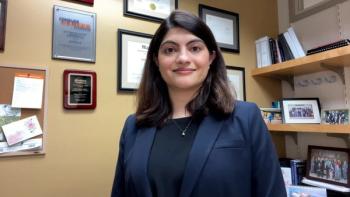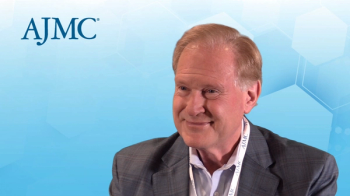
Forecasts indicate a drastic increase in US obesity rates in the next 25 years, emphasizing the need for comprehensive public health strategies.

Hayden is an associate editor for The American Journal of Managed Care® (AJMC®). She joined the AJMC team in 2021, where she produces written and video content covering multiple disease states.
She has a BA in journalism & media studies from Rutgers University. You can connect with Hayden on LinkedIn.

Forecasts indicate a drastic increase in US obesity rates in the next 25 years, emphasizing the need for comprehensive public health strategies.

Of the 518 hospitals that had at least 10 eligible discharges, only 11 of them prescribed SGLT2 inhibitors to more than half of their patients.

Clinical development and trial testing of vesleteplirsen (SRP-5051) for Duchenne muscular dystrophy (DMD) was stopped, with the developer citing safety concerns, FDA feedback, and an evolving therapeutic landscape.

Young adults with type 2 diabetes and lower incomes face significantly higher mortality risks, highlighting socioeconomic disparities in health outcomes.

Noninvasive liver fibrosis scoring systems may help identify who is at risk of developing heart failure.

One study suggests these drugs could increase depression risk in heart attack survivors who retained normal heart pumping function, while providing no life-saving benefit.

A total of 7 states passed ballot measures during the 2024 presidential election to enshrine abortion access into their state constitutions, though not all of them are immediately taking effect.

Higher levels of these fatty acids may reduce the risk of developing several types of cancer, though certain risks, such as a potential link to prostate cancer, highlight the complexity of their impact on overall cancer risk.

Independent pharmacies have filed 3 class action lawsuits against GoodRx Holdings and major pharmacy benefit managers (PBMs).

Sanjula Jain, PhD, chief research officer at Trilliant Health, discusses the rapid adoption of glucagon-like peptide 1 inhibitors for diabetes and preventive care for obesity and late-onset diabetes.

Health care costs continue to rise despite lower demand, while younger generations increasingly face chronic health challenges.

The outcomes of the EMBARK and CIFFREO trials in boys aged 4 to 7 have raised concerns in the Duchenne muscular dystrophy (DMD) community and prompted layoffs at Pfizer.

Caregivers of both adults and children with Duchenne muscular dystrophy (DMD) face significant disruptions to their work productivity and personal lives, underscoring the need for better treatments and support systems.


Standard zinc supplementation had limited impact on muscle health or zinc levels in boys with Duchenne muscular dystrophy, highlighting the need for more tailored nutritional strategies.

Payers and providers face challenges surrounding data integration, patient engagement, and financial pressures when trying to improve care quality and reduce costs.

Robert Lustig, MD, MSL, warns that sugary baby foods, rising birth weights, and ultraprocessed school meals are fueling long-term health risks in children.

A study in Indiana found that older adults in low-income clinics often experience memory problems that go undetected, with African American patients facing a significantly higher risk.

The history of women being left out of heart disease research has had significant consequences on heart health care today.

Unmet social needs in certain neighborhoods contribute to disparities in diabetes care, leading to greater reliance on emergency services, fewer preventive measures, and higher rates of complications.

Women are still being excluded from cardiovascular research trials, and it has a lasting impact on heart disease treatment for women today.

UMass Memorial Health–Harrington Hospital reduced 30-day readmissions for congestive heart failure by 50% using artificial intelligence and remote care teams.

A study of 555 patients further solidified genotype-phenotype correlations in Duchenne muscular dystrophy (DMD).

Between 2011 and 2020, the Veterans Health Administration spent $78 billion on health services for veterans also enrolled in Medicare Advantage.

Less than a third of FDA-mandated trials for drugs approved between 2015 and 2021 had been completed by May 2024.

Surbhi Sidana, MD, MBBS, shares how the addition of an anti-CD38 antibody to the VRd regimen significantly improves progression-free survival for patients with transplant-ineligible multiple myeloma.

Despite being eligible for guideline-directed medical therapy (GDMT), tens of millions of patients across the globe are not receiving the heart failure care they need.

The 2024 Trends Shaping the Health Economy report gave a past, present, and future look at diabetes care in the US and the role of obesity in these trends.

Popular artificial intelligence (AI) model GPT-4 answered 88% of questions correctly on a standardized patient safety exam.

The National Association of Accountable Care Organizations (NAACOS) September 2024 report outlined data integration, high-value culture, team-based clinical interventions, and more to enhance value-based care.

259 Prospect Plains Rd, Bldg H
Cranbury, NJ 08512
© 2025 MJH Life Sciences®
All rights reserved.
